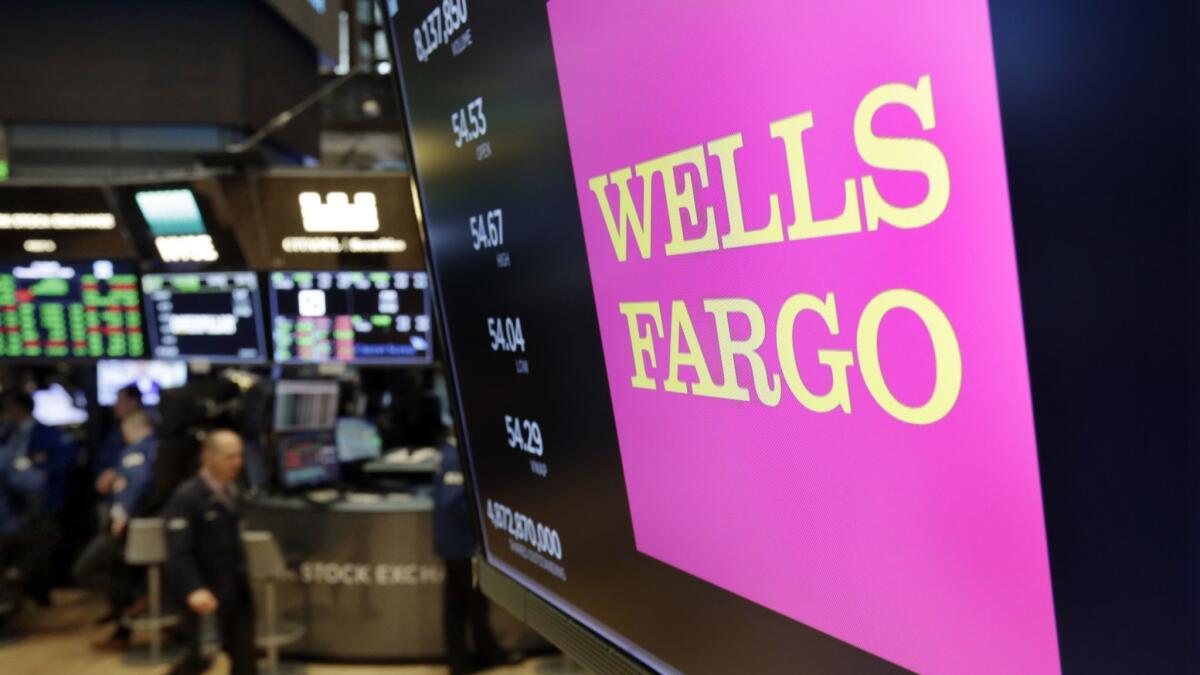Op-Ed: For big banks, breaking the rules is a trade secret

- Share via
In the Trump era, we may expect financial regulators to not regulate. But we don’t expect them to regulate, find wrongdoing, and then conspire with the wrongdoers to cover it up. But that seems to be what’s going on at the Office of the Comptroller of the Currency, which oversees federally chartered banks.
President Trump’s handpicked head of the OCC is Joseph Otting, former chief executive of OneWest Bank. Otting has decided to run interference for his CEO buddies, concealing evidence of a potential replay of the Wells Fargo fake account scandal.
Earlier this month, Otting’s office was forced to reveal some basic findings from an OCC review of sales practices at more than 40 large and midsize banks, triggered after Wells Fargo admitted to opening millions of accounts without customer consent. Thomas Curry, President Obama’s OCC chief, initiated the review, and Otting completed it in December.
Enter the Fray: First takes on the news of the minute from L.A. Times Opinion »
Since then, OCC had said only that it found no “systemic issues.” But in fact OCC did unearth examples of other banks opening unauthorized accounts. In fact, it flagged 252 “matters requiring attention” and five “industry-wide” issues. I’m using frustratingly vague terms like “other banks” and “industry-wide issues” because nobody outside the the OCC knows which banks were cited, or for what behavior, or whether any were penalized.
Otting revealed a little more while testifying on Capitol Hill last week. Roughly 20,000 accounts were found to be out of compliance, he said, at least half of them unauthorized, out of 500 million accounts studied. Otting said this low ratio proved the issues were not pervasive.
Asked repeatedly to make the banks’ names public, Otting contended that would be “inappropriate.” In other words, the industry’s lead regulator believes that for banks, breaking the law is a trade secret.
The out-of-context numbers also fail to provide enough information to understand the problem. For example, the OCC looked at more than 40 federally chartered banks with over $10 billion in assets; did that subset include giants like Bank of America, JPMorgan Chase and Citibank, or not? The OCC also reviewed only three years of account openings, but Wells Fargo kept finding more fake accounts the further back they went, eventually settling on 3.5 million since 2002. It’s also unknown whether the OCC investigated other types of sales practices. Wells Fargo, for example, placed unwanted auto insurance on borrowers, overcharged servicemembers for mortgages, and performed close to a dozen other abuses.
Wells Fargo was not necessarily motivated by charging customers fees on unauthorized accounts; that generated relatively little income. The intention was to prove to their shareholders that the bank was growing by “cross-selling” products to existing customers. It wasn’t so much consumer fraud as it was securities fraud.
In a letter to lawmakers, Otting acknowledged that banks in the OCC review had credited employees for opening bad accounts — ones that were never activated or funded by an existing account. That sounds a lot like Wells Fargo’s scheme. Were these other banks also touting sales growth to investors? Are the stock valuations of the entire retail banking sector based on fraudulent numbers?
There has been plenty of murmuring about shoddy sales practices at major banks beyond Wells Fargo. Front-line salespeople with the Committee for Better Banks coalition have said for years that high-pressure sales tactics were the industry standard. A 2015 study of bank workers from the Center for Popular Democracy reached the same conclusion. Isolated enforcement actions and allegations against banks like TCF Financial, Citizens Financial Group, Santander and TD Bank highlight deceitful strategies to hit sales targets.
The industry’s lead regulator believes that for banks, breaking the law is a trade secret.
The OCC review could have uncovered the depth of high-pressure selling and whether reported sales numbers are based in reality. It could have given customers valuable information to decide where to hold their money. Instead, Otting has refused to come clean. And that’s thoroughly unsurprising, given what we know about the man.
In his first speech as OCC chair, Otting proclaimed, “I like banks!” and referred to financial institutions as his “customers.” Otting was caught buying financial stocks even after being nominated as a bank regulator. And when he ran OneWest Bank, it committed a litany of wrongdoing for which it paid hundreds of millions of dollars in fines. Otting is, at best, an unreliable narrator on matters of bank misconduct.
By hiding the details from OCC review, Otting is helpfully shielding banks from what could be a major scandal. This agency has historically acted more as a bank protector than a regulator. During the Obama administration, Thomas Curry started to change the culture, but under Otting it appears to have slid right back. If Otting doesn’t want people to believe that he plotted with his ex-fraternity of bank CEOs to bury their record of shoddy and predatory practices, he has one option: Release the report.
David Dayen is a contributing writer to Opinion.
Follow the Opinion section on Twitter @latimesopinion and Facebook
More to Read
A cure for the common opinion
Get thought-provoking perspectives with our weekly newsletter.
You may occasionally receive promotional content from the Los Angeles Times.









